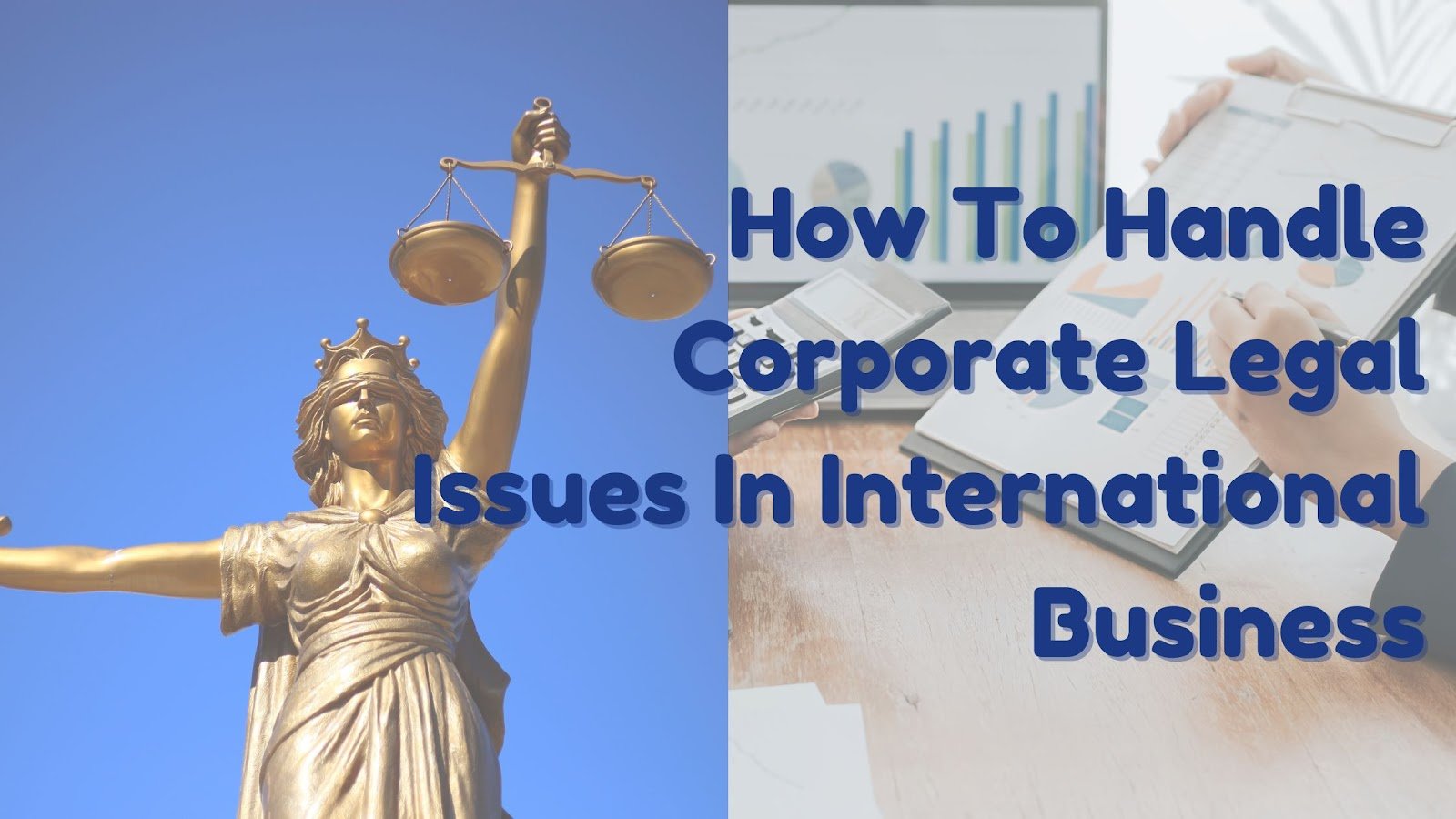
How To Handle Corporate Legal Issues In International Business
In the ever-evolving landscape of international business, companies face many challenges, with corporate legal issues ranking among the most serious. These legal complexities can stem from differences in regulations, cultural misunderstandings, or geopolitical factors, all of which can hugely impact business operations.
This is why effectively navigating these legal challenges is necessary for ensuring smooth operations, maintaining compliance, and protecting the company’s reputation and assets. But fret not if you’re not aware of all this.
Yes. This article will tell you about corporate legal issues in international business, their potential impact on your business, and practical ways to handle these issues effectively. So, continue reading.
What are Corporate Legal Issues in International Business?
Corporate legal issues in international business encompass a broad spectrum of legal challenges that companies encounter when operating across borders.
These issues can include:
- Regulatory Compliance: Each country has its own set of regulations governing business practices, including labour laws, environmental standards, and corporate governance requirements. Ensuring compliance with these diverse regulations is essential but often complicated.
- Intellectual Property Rights: Protecting intellectual property (IP) across different jurisdictions can be challenging. Varying IP laws mean that a trademark or patent in one country might not be recognized or protected in another.
- Contractual Disputes: Differences in legal systems can lead to misunderstandings and disputes over contracts. These disputes can arise from variations in contract law, interpretation, and enforcement.
- Taxation Issues: Navigating the complexities of international tax laws, including double taxation and tax treaties, is crucial for optimizing tax liability and ensuring compliance.
- Employment Laws: Different countries have varying labour laws regarding employee rights, benefits, and termination procedures, making international HR management complex.
- Corporate Governance: Adhering to the governance standards of multiple countries requires a thorough understanding of local corporate laws and practices.
How Can Legal Issues Affect Your International Business?
Corporate legal issues in international business can have far-reaching implications for a company. Some of the potential impacts include:
- Financial Penalties: Non-compliance with local laws and regulations can result in heavy fines and penalties, significantly affecting the company’s bottom line.
- Operational Disruptions: Legal disputes and regulatory challenges can lead to delays, operational shutdowns, or even bans on doing business in certain countries.
- Reputation Damage: Legal issues can tarnish a company’s reputation, resulting in a disappearance of customer trust and potential boycotts.
- Loss of Intellectual Property: Failure to protect IP adequately can result in the loss of competitive advantage, with rivals potentially exploiting your innovations.
- Tax Liabilities: Mismanagement of international tax obligations can lead to significant tax liabilities and legal action from tax authorities.
- Employee Dissatisfaction: Misunderstandings or non-compliance with local labour laws can lead to employee dissatisfaction, strikes, or legal action from employees.
How to Handle Corporate Legal Issues in International Business?
In this section, you’ll get effective tips on how to handle these issues.
- Comprehensive Legal Research
Before entering a new market, conduct thorough legal research to understand the regulatory environment. This includes local business laws, tax regulations, employment laws, and IP protection mechanisms. Engage local legal experts to ensure you have accurate and up-to-date information.
- Hire Experienced Legal Advisors
Having experienced legal advisors who specialize in international business law is invaluable. These professionals can guide you through the complexities of different legal systems and help you navigate regulatory challenges effectively.
- Develop Clear Contracts
Ensure that all contracts are clear, comprehensive, and compliant with local laws. Include clauses that specify the governing statute and jurisdiction for dispute resolution. Regularly review and update contracts to reflect any changes in local regulations.
- Implement Compliance Programs
Implement sturdy compliance programs to ensure adherence to local laws and regulations. This includes regular training for employees on compliance requirements and setting up internal audits to identify and address potential compliance issues.
- Protect Intellectual Property
Register your intellectual property in each country where you operate. Work with local IP attorneys to understand the nuances of IP protection in different jurisdictions and take proactive measures to safeguard your IP assets.
- Engage in Tax Planning
Develop an extensive tax strategy that considers the tax laws of all countries where you operate. Utilize tax treaties and plan your operations to minimize tax liabilities legally. Engage tax professionals with expertise in international taxation to assist in developing and implementing your tax strategy.
- Stay Updated on Legal Changes
International laws and regulations are constantly evolving. Stay informed about legal changes in the countries where you operate by subscribing to legal bulletins, attending industry conferences, and maintaining close relationships with local legal advisors.
- Cultural Sensitivity Training
Legal issues often intersect with cultural differences. Provide cultural sensitivity training to your staff to help them understand and respect local customs and business practices, reducing the risk of misunderstandings and legal disputes.
- Dispute Resolution Mechanisms
Establish clear mechanisms for resolving disputes, such as arbitration or mediation, which can be faster and less costly than litigation. Ensure that these mechanisms are included in your contracts and understood by all parties involved.
Bottom Line
Ultimately, navigating corporate legal issues in International business is a complex but significant aspect of operating globally. By understanding the potential legal challenges and implementing proactive strategies, businesses can mitigate risks, ensure compliance, and protect their interests. Comprehensive legal research, experienced legal advisors, clear contracts, robust compliance programs, IP protection, tax planning, staying updated on legal changes, cultural sensitivity training, and effective dispute resolution mechanisms are all crucial components of successfully handling these challenges.
Incorporating these practices not only helps in managing legal issues but also fosters a stable and legally compliant business environment. For companies seeking expert guidance, services like those provided by Innerwork Advisors, which offers legal advisors and private investigation services, can be invaluable in navigating the complexities of international business law.
Also Read: How To Respond To An Eviction Notice: Steps And Legal Options






